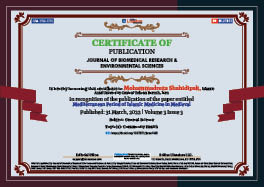Mohammadreza Shahidipak*
Volume3-Issue3
Dates: Received: 2022-03-11 | Accepted: 2022-03-30 | Published: 2022-03-31
Pages: 307-310
Abstract
Mediterranean is the birthplace of civilizational changes in world. There is special school of medicine in east of Islamic world which was formed by transferring Iranian medical heritage from ancient university of Jondishapur and medical sciences of India, Alexandria, Greece and Egypt. Therefore, Baghdad has arisen as a combined medical school. There is same school of medicine was established in west of Islamic world by evolutionary processes of Islamic medicine during its Mediterranean life and produced independent medical schools. Medical experience schools of ancient Cairo, Tunisia, Cordoba and Sicily transferred in Qairwan. This shows that medical development in Mediterranean world of Islamic period has been an increasing development, and Islamic medicine in the Mediterranean. Despite having Iranian roots and its origin go back to Avicenna, the founder of Islamic medicine and philosophy had a higher position than each other. It has acquired its oriental type. The medical school in the Mediterranean took place with the transfer of medicine from the first house of wisdom in the Islamic world to the second house of wisdom, which was built in Qairwan by Aghlabids state. The reality of Mediterranean period of Islamic medicine and its physical role in history of world medicine played by House of Wisdom (Beit al-Hakmeh ) Qairwan in the last stages of its development has prepared the collection of Islamic medical knowledge produced in Beit al-Hikma in Baghdad for final development by combining Latin teachings. By Transfer of Roman and Byzantine; medical knowledge from the Latin world to the Islamic world, which was a major milestone in the history of world medicine in southern Europe was made in Andalusia on the Iberian Peninsula, setting the stage for the latest evolution of medicine. A vast body of medical knowledge was transferred from North Africa and Andalusia to Europe (Salerno Italy) at the beginning of the European Renaissance.
FullText HTML
FullText PDF
DOI: 10.37871/jbres1438
Certificate of Publication

Copyright
© 2022 Shahidipak M. Distributed under Creative Commons CC-BY 4.0
How to cite this article
Shahidipak M. Mediterranean Period of Islamic Medicine in Medieval. J Biomed Res Environ Sci. 2022 Mar 31; 3(3): 307-310. doi: 10.37871/jbres1438, Article ID: JBRES1438, Available at: https://www.jelsciences.com/articles/jbres1438.pdf
Subject area(s)
References
- Osman A. Relations between Tunisia and Iran through history, Tunisia. 1972;128-131.
- Sarton Gorj. Introduction to the history of sciences, translated by Afshar Teran. Frhangi publisher. 1975. https://tinyurl.com/ynzsj9zw
- Akawi, Rahab K. Al-Mujaz in the history of medicine in the Arab world, Beirut, Dar al-Manar. 1995;244.
- Shahidipak MR. African Islamic culture and civilization in the era of the Aghalebids. 2019. https://tinyurl.com/vxfcd3se
- Ibn Jaljal. Classes of physicians and wise men. 2000;19-21.
- Shahidipak MR. History of Tunisian medicine in the Hafsi period. Journal of Islamic history. 2005;24. https://tinyurl.com/mssm523d
- Hamidan, Zuhair. Declaration of Islamic presence in the basic sciences and application in Andalusia, the West, Algeria, Tunisia and Libya, Damascus. 1966.
- Shahidipak MR. The manifestations of Islamic culture and civilization in the era of the government and government of Hafsids. 2017. https://tinyurl.com/u65vmy6d
- Harakat Ibrahim. Entry to the history of sciences in the west of the Muslim evens the twentieth century, Beirut. 2001;1:412.
- Juljul, SulaymÄn H. Class of physician and scientist (Tabaghat AL-ateba). 1990;19-21.